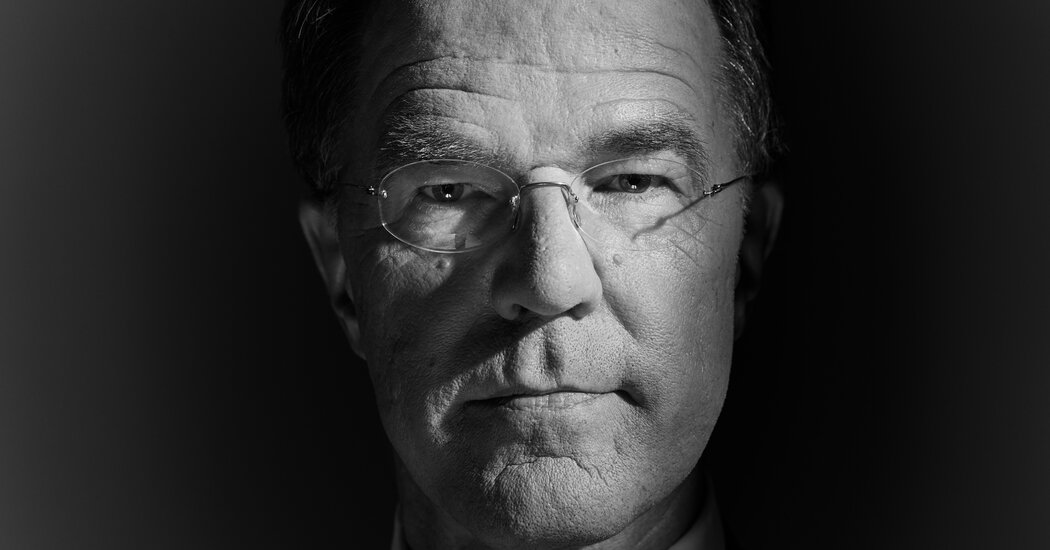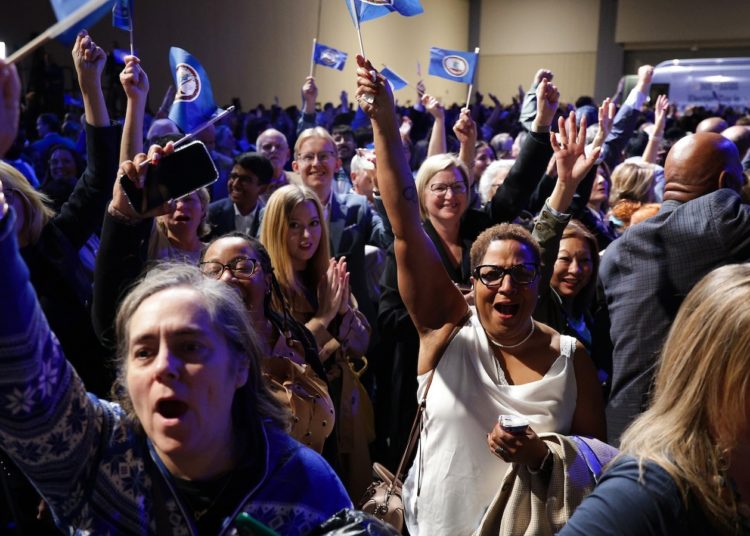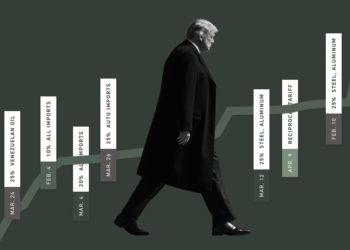There is no doubt that President Trump has had an electrifying effect on NATO. The North Atlantic Treaty Organization was founded after World War II to act as a bulwark against the Soviet Union. In theory, its member nations — 32 of them now, including most European countries, Canada, Turkey and the United States — are bound by a pledge of common defense: The alliance’s most famous provision, known as Article 5, states that an attack on one member country would obligate the response of all. In practice, however, the United States is by far the most important member. For the 76 years of NATO’s existence, America has provided the troops, intelligence, logistics and nuclear arsenal that makes the alliance work.
Trump, however, has long been a NATO skeptic. He has excoriated NATO as a financial drain on the United States, and it was reported that several times during his first term he even privately threatened to withdraw from it. Lately he has demanded that NATO nations pay much more for their own defense and has questioned whether the United States would come to Europe’s aid if Russia invaded a member country.
Mark Rutte is the man who has been tasked with keeping Trump happy while setting up NATO for a new, more dangerous era in which Russia has expansionist ambitions, the United States is seen as less reliable and Europe is woefully underprepared to fight its own battles. He became NATO’s secretary general late last year after 14 years of serving as prime minister of the Netherlands, where his longevity as a right-of-center leader earned him the nickname Teflon Mark.
I recently met Rutte at NATO headquarters in Brussels after a pivotal summit at which NATO members pledged to spend 5 percent of their G.D.P. on defense by 2035, up from the required 2 percent now. It’s a number that Trump demanded, and Rutte delivered. But the biggest headlines out of the summit were actually about Rutte’s relationship with Trump. Before the summit, Trump posted on Truth Social a highly complimentary private text message that Rutte sent him about the American bombing of Iran’s nuclear facilities. And then, during the meeting, Rutte joked that Trump acted as a “daddy” to misbehaving Middle Eastern nations, which Trump clearly loved — Trump’s fund-raising committee even started selling “Daddy” T-shirts.
For some observers, this all was evidence that Rutte is willing to do whatever it takes to keep Trump happy, even though the United States is reportedly considering moving thousands of troops out of Europe and, just after I spoke to Rutte, announced that it is halting more weapons shipments to Ukraine. Whatever his motivations, what was clear to me in our conversation is that Rutte is not interested in alienating the American president.
Subscribe: Apple Podcasts | Spotify | YouTube | Amazon | iHeart | NYT Audio App
I’m going to start with a big but basic question: Why should NATO matter to Americans now? What do Americans get out of this treaty today? If you want to defend the U.S., you have to make sure that three things are secure. You need a secure Arctic, because it is opening up and the Chinese and the Russians are sailing there. You need a secure Atlantic, because it’s your sea; it is crucial. And you need a secure Europe, because Russia’s here, and Russia is reconstituting itself at an incredible pace — not to attack Norway, but to attack ultimately the U.S. If the Arctic, if the Atlantic Ocean, if Europe is not secure, the U.S. has a big problem.
I’m assuming that’s how you sold it to President Trump, who has not been a big fan of NATO and essentially views Europe, as he has mentioned in the past, as a bunch of freeloaders. He sees it as European nations basically funding their welfare states at the expense of American defense. Do you think that view is fair? The second half of the view is fair, but the first half I would not buy into, because I’m confident of the fact that Trump very much realizes that for the U.S. to stay strong and safe, there is this embeddedness with European security and working together to keep the Indo-Pacific safe. But I do agree with the second half, because there are these enormous irritants since Eisenhower with American presidents, and I think they’re completely right that the Europeans were not paying enough. So he has a big point, and luckily, last week in The Hague, we solved it.
Before we get into that substance, I’d like to talk a little bit about style, because your interactions with President Trump in the aftermath of that meeting have been called, and I’m quoting here, “fawning” and “an orchestrated grovel.” I saw someone refer to NATO now as the North Atlantic Trump Organization. How do you see it? I think when somebody deserves praise, that praise should be given. And President Trump deserves all the praise, because without his leadership, without him being re-elected president of the United States, the 2 percent this year and the 5 percent in 2035 — we would never, ever, ever have been able to achieve agreement on this.
I want to get to what exactly these numbers are and what they mean, but there are these two camps after the summit. One said that you did what you did to pacify President Trump’s ego and have a successful summit, which you did. And the other said that while our president likes flattery, he ultimately sees it as weakness, and it only appeases him for so long. I’m sure you’ve seen all this commentary. I was prime minister of the Netherlands for 14 years, so I know about criticism, but I don’t care. In the end, I need to do my job. I have to keep the whole of NATO together. And the biggest ally is the United States. That biggest ally has paid, since Eisenhower, more than the Europeans. And now, for the first time in 65 years, we will equalize between what the U.S. is paying and what the Europeans are paying. And without Trump, that would not have happened.
Did you mind the text message that you sent him being made public by him? Not at all, because what was in the text message is exactly as I see it. One, that he did an excellent job on Iran with the bombing of the nuclear facility. And as I said in that text message, you are now flying into another big success, which is a NATO summit, which will commit to 5 percent defense spending, and this is transformational.
All right. We are meeting after this NATO summit, and the big success is that the member nations — except for Spain — agreed to increase their defense spending to 5 percent of their G.D.P. by 2035. Can you briefly talk me through why 5 percent is the right number? Yeah, and by the way, all 32 agreed. There’s one issue with Spain. Spain is saying, OK, we agree, but we think we can reach all those capabilities with a lower investment. That is absolutely impossible, so history will prove them wrong. But that’s an agreement to disagree.
But to your question: We have an enormous geopolitical challenge on our hands. And that is first of all Russia, which is reconstituting itself at a pace and a speed which is unparalleled in recent history. They are now producing three times as much ammunition in three months as the whole of NATO is doing in a year. This is unsustainable, but the Russians are working together with the North Koreans, with the Chinese and Iranians, the mullahs, in fighting this unprovoked war of aggression against Ukraine. So here, the Indo-Pacific and your Atlantic are getting more and more interconnected. We know that China has its eye on Taiwan. Given this whole geopolitical setup, there is no way we can defend ourselves if we stick to this old 2 percent.
So when it comes to core defense spending, we have to move up to 3.5 percent. And then of course there is all the defense-related spending. We need to develop the defense industrial base. We need to spend money on cyber, on hybrid. We need to prepare our societies at large beyond the military. That’s the extra 1.5 percent leading into the 5 percent. So, yes, this is an enormous amount of spending. But if we don’t, we’ll have to learn Russian.
I’m sure you saw comments by Russia’s foreign minister, Sergey Lavrov, that this new target will cause the end of NATO because it will basically bankrupt NATO members. Essentially, he’s saying NATO is involved in a costly arms race. I know Sergey Lavrov very well. He has been foreign minister of Russia since the birth of Jesus Christ, and I’ve never taken him seriously. When you talk about fake news, listen to Sergey Lavrov.
So you’re not worried about an arms race between Europe and Russia? No, not at all. We have to make sure that the deterrence is there, and the fact that Lavrov makes that comment — again, I would not take too much interest in his comments, but it is clearly evidence that the deterrence is working. And that is crucial, because Russia is on a war footing in every sense. The size of the military, what they’re investing in, in their tanks, in air defense systems, in their artillery, in ammunition — it is amazing.
Chancellor Friedrich Merz of Germany said, “Money alone won’t solve our problems.” We’ve talked about spending, but what are the problems that you see with actually making that spending effective? He is totally right, because the deterrent is only real if we have the people and the industrial output to make sure that the people can make use of the weaponry we need to really defend ourselves. So these are the two issues we really have to work on. To get the right number of people in the military is something at a national level, and countries can make decisions: yes conscription, no conscription, spending more on salaries for your military —
You think that Europe’s going to have to do conscription? No, no, that’s up to the individual countries to decide. Some countries will do it. Finland already has conscription. Others will not do it, but it will mean in general paying good salaries for our men and women in uniform. What I’m particularly worried about is the defense industrial output, and this is a problem across the alliance, because we simply lack the defense industrial base to produce the weapons we need to make sure that we can deter the Russians or the North Koreans or whoever to attack us. And this we are working on very quickly now.
There was this big New Yorker article that came out recently, and it described a training exercise in Estonia, which is a member state, to test its readiness for a possible Russian invasion. The piece noted that Estonia has no air force, has no navy. And in the exercise, the team playing the invading army had a “capabilities overmatch” — more heavy armor, more long-range fire. Basically, it did not go well for Estonia. Was that exercise a wake-up call for you? No. What The New Yorker described there is right, but it’s not a wake-up call, because we have all the plans in place that if Estonia will be attacked — and the Russians know this — our reaction will be devastating. I cannot go into all the details, because Vladimir Putin, I know, is watching these programs. But we have to make sure that we not only have those plans but we also have the people and the military gear to back it up. And this is exactly why we need to spend more. But it’s not that the Estonians are left to themselves. It would be the full force of NATO, including the full backup of the United States, which will come to the rescue. Putin knows this. This is why he will not attack Estonia today. But he might in five or seven years if we would not make all these extra investments.
There’s a key sentence in what you just said, which is “with the full backup of the United States.” This is clearly what so much of the concern and discussion has been about, because President Trump has never fully committed to coming to Europe’s defense if indeed something like that should happen. Are you confident at this moment that if Estonia were invaded, the United States would come to its aid? One hundred percent. I have no doubt at all, and it was very clear in the closing press conference in The Hague. But also everything I’ve discussed over the last six months with the new U.S. administration — absolutely no shiver of a doubt that the U.S. is completely committed to NATO, is completely committed to Article 5. There is one big irritant, and that is the fact that the Europeans have not paid their fair share.
That is the irritant that President Trump talks about publicly, but there is an underlying issue as well, which is that President Trump does not like to get into foreign entanglements. He has a very transactional view of the world: If it’s good for him or good for America, then he will do it. So are you certain that the only irritant was that the Europeans weren’t paying enough, or is there a fundamental disconnect between the way that the American president views the world and commitments to these international organizations? I don’t believe so. President Trump put in place an excellent foreign-policy team, including Marco Rubio and Pete Hegseth and Matt Whitaker, the ambassador here at NATO. And there is broad agreement that when it comes to the defense of NATO territory, the U.S. is part and parcel. That means that it’s not only about defending Europe; it’s about the United States, for the reasons I mentioned earlier: that the U.S. is not secure if the Atlantic, Europe and the Arctic are not secured.
There’s a second reason that has to do with the Indo-Pacific. There’s an increasing realization, and let’s not be naïve about this: If Xi Jinping would attack Taiwan, he would first make sure that he makes a call to his very junior partner in all of this, Vladimir Vladimirovich Putin, residing in Moscow, and telling him, “Hey, I’m going to do this, and I need you to to keep them busy in Europe by attacking NATO territory.” That is most likely the way this will progress. And to deter them, we need to do two things. One is that NATO, collectively, being so strong that the Russians will never do this. And second, working together with the Indo-Pacific — something President Trump is very much promoting. Because we have this close interconnectedness, working together on defense industry, innovation between NATO and the Indo-Pacific.
It’s interesting that you talk about Trump’s foreign-policy team and their understanding and commitment to NATO’s security. The U.S. has had up to 100,000 troops stationed across Europe as part of its NATO commitments, including about 20,000 that President Biden deployed after Russia’s invasion of Ukraine. But the Trump administration is now saying that it is going to redeploy some of those to other parts of the world. Have you been told what that drawdown will look like? There is no talk at this moment of a drawdown. What we know is that Europeans have to spend more. That’s what we are doing. When it comes to the troop numbers, we have all agreed there should be no capability gaps in Europe. Whatever needs to happen in the future to pivot more toward Asia has to be done in a way that indeed those capability gaps are not there, that there are no surprises. This is exactly the way I’m discussing this with the American administration.
President Emmanuel Macron of France said it would be nice to know what the timeline is for reductions, which says to me that America’s greatest European allies do not have a sense of when this is happening and what the number will look like. Do you have a sense of when this is happening and what the number would look like? Well, I have a sense of the fact that we all agree that NATO is integral. Let’s not forget, the only time Article 5 was ever triggered was a day after 9/11, when now Lord Robertson, the then-secretary general, declared an Article 5 situation because of the attack —
Secretary General, what I’m asking here is: You say that the commitment is ironclad, and yet what we are seeing, while a war is raging with a resurgent Russia on Europe’s doorstep, is the United States pulling back from Europe. I really have to correct you. The United States is not pulling away from Europe. What the United States expects the Europeans to do is to take care of their own defense at a larger scale than we do currently, which is only logical. Let me assure you that all the plans we have, part of those plans is that Europeans gradually — and this is a shift — take more of the burden for the defense of this part of NATO territory from the U.S., so that the U.S. can therefore pivot more toward Asia, toward the Indo-Pacific, as the U.S. should. This is also in our European interest, because we know that China and North Korea are very much involved in this war effort in Ukraine. So this is all interconnected.
On Ukraine, one place where NATO and the U.S. seem to diverge is on the question of Putin’s actual appetite for peace talks. Both Trump and Secretary of State Marco Rubio made comments very recently suggesting that they believe talks are still on the table. A senior NATO official, on the other hand, said that “we continue to doubt that Russia has any interest in meaningful negotiations.” Where do you stand on this? With the risk that I’m again praising President Trump: He is the one who broke the deadlock with Putin. When he became president in January, he started these discussions with Putin, and he was the only one who was able to do this. This had to happen. A direct dialogue between the American president and the president of the Russian Federation. Then, of course, this is a step-by-step process. We’ve now had two rounds of peace talks in Istanbul, where the Ukrainians sent a very senior team, took it very seriously, and unfortunately the Russians sent this historian not to be taken so seriously. So, we are not there yet, and that means that in the meantime you have to make sure that Ukraine has what it needs to stay in the fight. The good news is that the Europeans have now cobbled together $35 billion in military aid this year to deliver to Ukraine, which is more than last year.
The Europeans have had to do that because the United States has stepped back from doing that. But isn’t it logical that the United States has asked the Europeans, “Could you please over time take more of the burden when it comes to the concrete support to Ukraine?” I think that is totally logical and totally fair.
One thing is take over more of the burden. Another thing is: We’re going to pretty much pull the plug. Who told you this?
There is a real difference of opinion on what exactly America’s commitment to Ukraine is. The American administration completely takes the view and shares it with the Europeans that this war in Ukraine is crucial for the defense of NATO territory going forward and that we have to make sure that Ukraine is in the strongest possible position to stop the Russians from taking more territory, and that when it comes to a cease-fire or, even better, a peace deal, that Ukraine with some help will be able to prevent Putin from ever attacking Ukraine again in the future. But when it comes to the actual money spent, I think it’s only fair that the Europeans take a bigger share of the burden.
When I was preparing for this interview, obviously I read a lot about you. One thing that really struck me was that while you were prime minister of the Netherlands, you advocated withholding pandemic funds from countries that weren’t adhering to E.U. democratic values — that countries that weren’t acting in a democratic fashion shouldn’t be the beneficiary of money coming from the E.U. Which was a broadly held view in Europe.
It made me wonder: Do you think countries that aren’t credible democracies should be part of NATO? Well, I’m now leading this alliance of 32 countries. And that means that I have only one job, and that’s making sure that the whole alliance stays together, that we stay on one page. And that means that the last thing I’m going to do is discuss national politics.
But part of the idea of NATO is about allies who share a commitment to democratic values. It was created for that. And now you have as part of this alliance what some would call a democratically backsliding United States. You have Hungary, which calls itself an illiberal democracy. And you have Turkey under President Erdogan, which has been called an electoral autocracy. Can this alliance hold when the very values at its heart are no longer commonly held in the way that perhaps they once had been? I’m not sure I would completely subscribe to all the assumptions in your question, but that is a debate, as democracies, that we can have, and that is why we are indeed an alliance of democracies. I can tell you that in NATO, you will have many debates and issues between countries. There are debates on values, on everything. That’s exactly why this alliance is so alive and so strong, because we sometimes have these tough issues. We fight them out, and then we come together and agree. And at this moment, I can only tell you that this alliance of 32 countries is stronger and more united than ever in recent history. I cannot in my role debate the pluses and minuses of what is happening in each of the 32 countries.
Viktor Orban’s close relationship with Putin is very well documented. So it’s not just about debates and competing viewpoints. This is about the very soul of the alliance and what it’s meant to do. I understand. And that means that sometimes internally, without the press there — and that is not very democratic, but that’s the only way to do it — in a discreet way, you have your discussions and your debates, but never out in the open. That’s impossible. And by the way, what you said about the U.S. and backsliding, I would not agree with this. I think the U.S. is still one of the strongest democracies on Earth.
Secretary of Defense Pete Hegseth recently refused to rule out military intervention in Greenland. You’ve said before directly to President Trump that you don’t want to drag NATO into this. But Greenland is governed by Denmark, a member of NATO. So what do you do when one NATO country is talking about attacking the territory or taking over the territory of another? Sorry for the boring answer again, but when it comes to these issues between NATO allies, I can never comment about them in public.
It’s this overarching question about what is the alliance really about and if these 32 members are still united by a common vision. And they are, and we are.
So it doesn’t concern you that Trump has also talked about annexing Canada, for example, also a NATO member? When I’m not commenting about discussions between individual allies, of course I will not comment on that. No, I can’t. That’s not my role.
Just to step back, a lot of what is being discussed around NATO is uncertainty about America’s role in the alliance. And the reason that there’s this uncertainty is because of the things that we’ve discussed: Trump is mercurial on international obligations. Things like the Greenland and Canada issues make people worry about America’s expansionist ambitions, possibly. And so, as an alliance that relies on the intelligence, the manpower, the weapons, the logistics, the nuclear umbrella of the U.S., can there be a NATO without the U.S., if it ever came to that? But it won’t come to that. It won’t. This is one picture. Let me give another one: Eight countries at 2 percent this year would never have happened without Trump. The whole of NATO committing to this 5 percent would not have happened without President Trump. All these things are there because of President Trump and his team. So this is also a way to look at it. Of course, his style can be a bit harsh. But without that style and him being sometimes harsh, I’m not sure that we would have the outcome at the NATO summit that we had.
I am hearing you articulate the feeling that you clearly, strongly have that Trump is handling America’s role in the world very well and that you don’t have any concerns about his relationship with NATO. What do you think the president’s critics don’t understand about him and the way he views America’s role in the world? You know, I’m a trans-Atlanticist. I was born in a family that felt deeply indebted to the United States, together with Canada and Poland, for liberating my part of Europe, the Netherlands. And I’ve always been raised with the absolute realization that without a trans-Atlantic relationship, which keeps the U.S. strong, which keeps Europe strong, we might have been Communist in this part of Europe at this moment, and part of the Soviet Union instead of part of the free world. And President Trump, in my view, is totally committed to that tradition. Very irritated indeed about the somewhat free-rider thing here in Europe, and that has now been corrected. I find it a bit unfair that we are constantly questioning the U.S.: Are you still with us? And if you are still with us, are you really with us or might you maybe leave us one day?
To be fair, that’s based on the president’s own statements. Yeah, but, for example, what he said about Article 5 — Article 5 is ambiguous in itself because we will never want to make Putin or Xi Jinping or whoever might ever try something against us wiser than he or she is at the moment. And look at this closing press conference in The Hague. I mean, it couldn’t be clearer than this. Put on the television when President Macron was visiting the White House, when Prime Minister Starmer was visiting the White House, when Prime Minister Meloni was visiting the White House. Listen to President Trump’s comments. You cannot have a clearer commitment to NATO than what he said on those occasions.
So you think NATO will last with America at its heart? Absolutely. I have no doubt of America being the leader in the world and also within NATO, with the Europeans taking their fair share in terms of the burden, and that’s only good. That makes NATO stronger and fairer and more lethal — exactly as we should be.
This interview has been edited and condensed. Listen to and follow “The Interview” on Apple Podcasts, Spotify, YouTube, iHeartRadio, Amazon Music or the New York Times Audio app.
Lulu Garcia-Navarro is a writer and co-host of The Interview, a series focused on interviewing the world’s most fascinating people.
The post The Head of NATO Thinks President Trump ‘Deserves All the Praise’ appeared first on New York Times.




